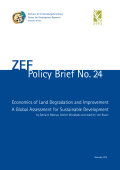
Our findings, based on satellite imagery data, show that land degradation hotspots cover about 30% of the global land area, where about 3.2 billion people reside.
Grassland areas experienced the most severe degradation. A third of the global grasslands and a quarter of croplands and about 29% of forest mosaics with shrubs and grasslands. Unlike many past studies, the present study shows that land degradation is a global problem occurring in both developed and developing countries as well as in tropical and temperate regions. Ground-truthing data in our six case-study countries showed a high degree of congruity between satellite imagery data and community perceptions of land degradation, and an intermediate congruity on areas that experienced land improvement – suggesting our land degradation results are robust.
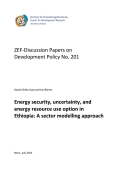
Ethiopia’s energy sector faces critical challenges to meeting steadily increasing demand given limited infrastructure, heavy reliance on hydroelectric power, and underdevelopment of alternative energy resources. The main aim of this paper is to investigate optimal least-cost investment decisions for integrated energy source diversification. We seek to contribute to the relevant literature by paying particular attention to the role of public policy for promoting renewable energy investment and to better understand future energy security implication of various uncertainties. Dynamic linear programming model created using General Algebraic Modelling Systems (GAMS) software was used to explore the national energy security implications of uncertainties associated with technological and efficiency innovations, and climate change or drought scenarios. To cope with the impacts of drought on hydroelectric power production Ethiopia would need to invest in the development of alternative energy resources. This would improve sustainability and reliability, but these changes would also increase production costs.
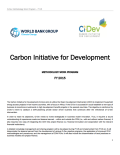
The objective of this note is to identify/assess the barriers preventing local financial institutions from utilising carbon finance to support their financing activities, and to summarise existing attempts in using carbon revenues to enhance the bankability of these projects by reducing risks. The note is a deliverable under the Carbon Initiative for Development’s (CiDev’s) Methodology Work Program for FY15 supporting the Ci-Dev achieve its objective of utilizing the Clean Development Mechanism (CDM) to spur the implementation of projects in low income countries, to the extent possible, with a focus on household energy access in Africa.
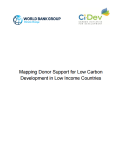
This report is prepared in response to a request by the participants of the Carbon Initiative for Development (Ci-Dev) for a desktop study describing donor activities in Low Income Countries (LICs) in Africa and Asia that have elements in common with the Ci-Dev Methodology Work Program (MWP). The scope of the research was broadened during implementation to allow for a review of initiatives that had similarities related to the entire Ci-Dev work program including business models. The intent of broadening the scope was to enhance the value of the report in assisting the CiDev work plan implementation by identifying opportunities to utilize potential synergies and avoid duplication with existing donor activities.
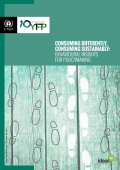
Human demands on Earth’s natural resources have outpaced what can be produced. A shift to more sustainable growth is dependent on changes in current patterns of both production and consumption. While recent policy has largely focused on addressing production and supply, consumption and demand must also be addressed. Today, in less than nine months, we consume more resources than our planet produces in a year, and our rate of consumption continues to grow.
The objective of this publication is to shed light on opportunities to strengthen the effectiveness of policies for sustainable consumption in both developed and developing countries. The publication provides evidence-based insights from behavioural science, detailing five key behavioural barriers to sustainable consumption. It also includes concrete examples of how behavioural science has been successfully coupled with policy to cost-effectively achieve sustainable consumption.
